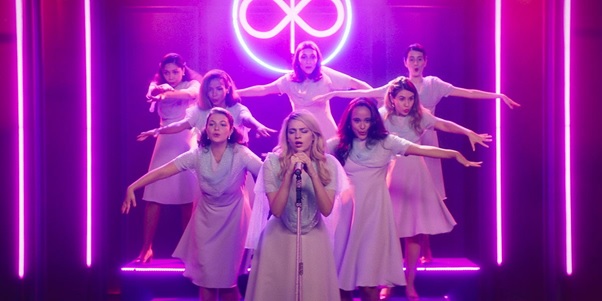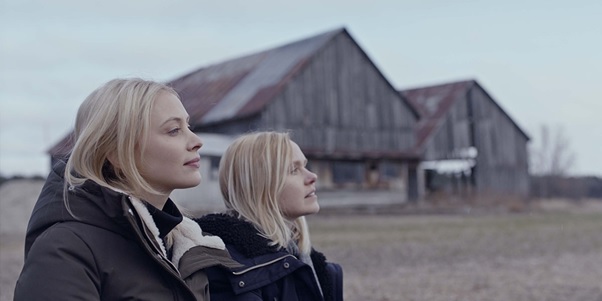To compelling, if varied, results, three films screened at the recently concluded TIFF2021 explored similar themes of women in crisis struggling to acclimate to the systems around them – Canadian family-drama “All My Puny Sorrows”, the Brazilian horror film “Medusa”, and the Danish drama “As In Heaven”. Despite the differences in geography and era explored, each of the films finds its centre in its fraught exploration of women struggling to adapt to the world around them.

Danish director Tea Lindeburg’s feature debut, “As In Heaven,” is a harrowing 19th century account of a childbirth that goes very wrong. However, our window into the story is not the mother-to-be, Anna. Instead, the film functions as a coming-of-age for the teenaged Lise, her eldest child. Interruption is the consistent refrain in the story. As extended family and neighbours waltz in and out of the story, we explore Lise’s day on the Danish farm in the 1880s. There’s a lull in the air as Anna’s labour pains intensify. Lise flirts with a crush and plays with her sister, all the while the threat of adulthood looms over.
This threat is best explicated in the brief, but momentous, appearances of Lise’s father. In one particular moment, he appears and directly interrupts a moment of sibling play, emphasising the harsher adult (and male) world that beckons. Lise’s mother has coached her in progressive ways, encouraging her to leave the farm to continue schooling. Her father, although absent, is unenthused by this plan. Lise seems caught in the middle, dallying on the boundaries of youth and beckoning adulthood.
Linderburg gets much cache from the rustic farm life as Lise wanders through the farm, observed and then observing – more the latter than the former. Fitting for a film so dependent on what is observed, the sound design is its strongest asset in conjuring the ambience of the world to unnerving degrees by the time a centre-piece – pivoting on a scream that goes on for what seems like minutes (but is hardly more than 30 seconds) emphasises the malaise at work. The spectre of religion and the reminder of female oppression linger but Linderburg is hewing so close to Lise’s perspective that the film seems limited by it – viscerally effecting, but so suffused with its own despair that it becomes difficult to see a way out of it.
Anita Rocha da Silveira’s “Medusa” seems much more effective at working through its explorations of grief and rage. The unnerving experimental horror film also knows a thing, or two, about women being oppressed. Here, the religiosity is frontloaded – and the female focus calcifies into something peculiar and intriguing. Like Linderburg, da Silveira is preoccupied with the promise of youth. In “Medusa”, a group of radical, fanatic women seek out sinful women and assault them until they “convert” them to Christianity. The young women are convinced this is their purpose, to present women as unblemished bastions of perfection that uphold the best values. Soon enough, they’ll come to realise that they are trapped in a prison of their own making.

“Medusa” is disorienting, alarming and at times confounding. The plot begins to take shape when one of the fanatics, Mari, is injured in one of their conversion outings. She’s scarred on the face, rupturing her move towards perfection. Image is everything, so what value does a scarred woman have anymore? “Medusa” is intriguingly unsubtle in its explorations, and that transparency becomes its weapon. By recognising the power of clashes, it merges horror with the absurd, mixing pathos with the bizarre. The opening scene is of a lone dancer that feels hypnotic, terrifying but also ridiculous. It’s a clash that feels decisive.
The singularity of this dystopian Brazil earns its power from the way the film plays around with lights and shadows. The opening credits roll by as the gang prowls for victims in the evening. Later scenes, after Mari finds a new job after being fired from her job as an assistant to a plastic surgeon, are filmed in a decrepit care-home, so decrepit you can almost smell the sense of despair. The women are placed in juxtaposition to each other, creating haunting, and then alarming, tableaus of sameness. Like, “As In Heaven”, the screams of a woman are a window into a sharp turn in perspective. But, where Linderburg’s screams felt like they went unheard, a cacophony of screams at the end of “Medusa” feel like a release. Didactic and intentional but the images and sounds linger…

The final film, the Canadian TIFF world-premiere “All My Puny Sorrows” is the most familiar, and least unusual of the lot. But there’s lots beneath the surface. A lot of the film, an adaption of Miriam Towes’ novel by director-writer Michael McGowan, is familiar. Even without foreknowledge of its source, it’s likely to deduce the writerly conceits in its structure. The main character is, after all, a writer.
The main-story, in linear format, is the push-and-pull between two siblings. Yola (Alison Pill), is a struggling novelist, imminent divorced, whose pity party is interrupted when her sister Elf (Sarah Gadon), a famed pianist, commits suicide. Yola is clinging to life, Elf wants out, and their widowed mother – an excellent Mare Winningham as Lottie – mediates, supressing her grief as she recalls her husband who committed suicide some decades ago. The linear-story is interrupted to flashbacks of their youth as “All My Puny Sorrows” becomes a restless manifestation of Yola’s own relationship with her memories and her family.
Even as All My Puny Sorrows is less immediately inventive, there’s much to appreciate in its approach to the familiar drama. McGowan has a keen understanding of his characters and mines their chemistry to excellent effects. Gadon and Pill feel like a pair with real, worked-out, chemistry and the scenes of them together are teeming with tension. But everything feels particularly threaded by Winningham in an expertly reticent performance of a mother in repose. It’s a talky film and Winningham’s silence feels precise and intentional amidst the talkativeness of her children.
Pill’s role is most demanding – she carries the main arc as well as overhead narration. While a subplot with her daughter feels out-of-sync at times, she carries the clashes in mood well. For McGowan, tragedy is always half a step from the outrageous and bizarre and Pill’s ability to move between the hilarious and the tragic keeps “All My Puny Sorrows” from feeling bathetic. Compared to the other two films, McGowan’s allusions to the oppressive Mennonite culture might feel understated. But, it’s a credit to his adaptation in keeping some things at bay. It’s an unusually subtle move from a film that tends towards the not-so-subtle in other respects.

